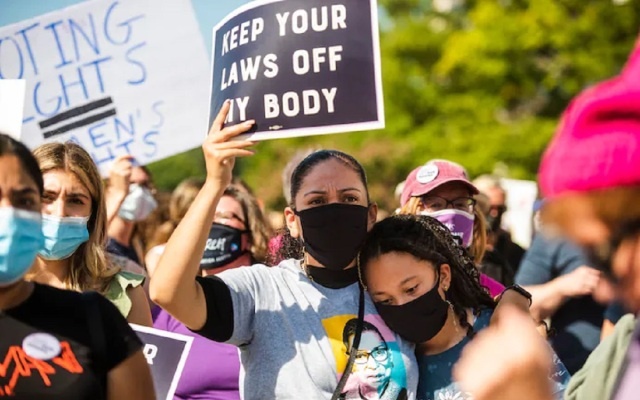Women’s rights marches are held in Washington and across the US, challenging the Texas ban on almost all abortions and the prospect of Supreme Court restrictions on choice.
The rallies were the organized by the Women’s March, which arranged the historic demonstrations in January 2017, since Donald Trump left the Presidency in January.
Alexis McGill Johnson, president of Planned Parenthood, told the crowd at the “Rally for Abortion Justice” on Washington’s Freedom Plaza:
No matter where you live, no matter where you are, this moment is dark — it is dark — but that’s why we’re here.
It is our job to imagine the light, even when we can’t see it. It is our job to turn pain into purpose. It is our job to turn pain into power.
See also Texas Women Going Out of State — If They Can — After Ban on Abortions
Marchers raised signs and chanted, “Abortion is health care!”, as Marsha Jones, executive director of the Texas-based Afiya Center, a Texas-based abortion rights organization, said, “You can no longer tell us what to do with our bodies.”
More than 600 rallies were staged. In New York, marches crossed the Brooklyn Bridge. In Jackson, Mississippi, Lisa White, 65, explained that women’s rights “slashed across the board” reminded her of her youth: her aspiration to become a law school was derided by men who thought “women should be barefoot and pregnant”. In San Francisco, student Jessie Reynolds, 20, said she was mobilized byt he Black Lives Matter movement.
That was my ‘coming to Jesus’ moment….[I hope this will] put the fire back in women. I wasn’t a part of this fight up until this year, and I’m hoping that a lot of other people have turned that switch on.
After the speeches in Washington’s Freedom Plaza, thousands of marchers moved east along Pennsylvania Avenue, chanting, “My body! My choice!”, to the beat of a drum line.
Katie Donovan, 18, from Maine explained, “I’m hoping my kids won’t have to protest for their bodies.”
Elaine Baijal, 19, said her mother told her of marching for legal abortion with her own mother in the 1970s: “It’s sad that we still have to fight for our right 40 years later. But it’s a tradition I want to continue.”

